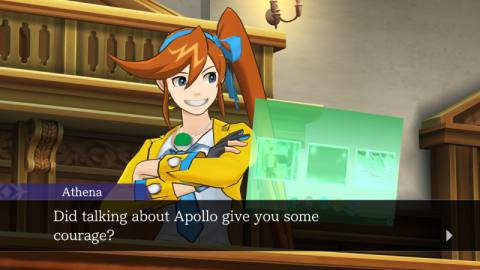
Reviewed on: Switch
Platform: PlayStation 4, Xbox One, Switch, PC
Publisher: Capcom
Developer: Capcom
Release:
Rating: Teen
Outsiders of the Ace Attorney series might not be familiar with the name Apollo Justice, but fans know the character is a big deal. He’s second only to Phoenix Wright in terms of playable appearances, and his new collection, the Apollo Justice: Ace Attorney Trilogy, gathers all of those outings in one convenient package. While there’s not much new content, quality-of-life improvements and a visual overhaul do a lot to modernize Apollo’s courtroom saga, making it a worthwhile journey for fans new and old.
The collection includes three games: Apollo Justice: Ace Attorney, Phoenix Wright: Ace Attorney – Dual Destinies, and Phoenix Wright: Ace Attorney – Spirit of Justice. While Apollo’s name is only in one of these three titles, he’s a crucial character in all three games, so the name is a fitting one. The package also includes DLC trials and outfits from the 3DS games, so if you want to rock Phoenix’s classic suit in Dual Destinies or dress Athena as a maid in Spirit of Justice, you’re free to do so. The DLC trials vary in quality (the second is great, the first is not), but they’re meaty pieces of content that I’m glad made it into the final collection.
 Apollo Justice prepares for his first trial in Apollo Justice: Ace Attorney
Apollo Justice prepares for his first trial in Apollo Justice: Ace Attorney
Besides the obvious convenience of being available on modern platforms, there are two main reasons to play the Apollo Justice Ace Attorney Trilogy instead of the original games. The first is the improved graphics; the Trilogy looks excellent. I’ll miss the pixel art of the DS days, but I quickly got used to the updated art style in Apollo Justice’s first outing. The animations translate exceptionally well – the series hasn’t lost an ounce of charm. The real improvement, however, comes in the latter two games in the Trilogy, which were originally released on the 3DS. While the first game is a good translation of the old art style into a new form, the 3D games look much better, and I often had to remind myself they weren’t released on the Switch from the get-go. It’s also great to view their anime cutscenes on a full-sized TV.
The other reason to play the Trilogy over old versions is its wonderful suite of quality-of-life improvements. I especially love Auto Advance, which moves the dialogue forward without forcing me to mash buttons, and the History button, which allows you to scroll back through dialogue you might’ve accidentally skipped. This game also includes a story setting, which automatically advances the game through trials and investigations if you don’t feel like solving any puzzles. While they’re mostly returning features from other modern Ace Attorney collections, the quality of life improvements return for a reason – they make these games significantly smoother to play, and I am extremely grateful to have them here.
 Athena Cykes in Phoenix Wright: Ace Attorney – Dual Destinies
Athena Cykes in Phoenix Wright: Ace Attorney – Dual Destinies
Apollo Justice: Ace Attorney Trilogy also includes a Museum section that allows players to look at concept art, listen to music, rewatch cutscenes, and look at character animations from each game in the Trilogy. It’s a nice touch, and I had some fun glancing at some of the art and animations, but it’s more of a novelty than anything else.
Outside of quality-of-life improvements, the games are unchanged and still worth your time. Apollo Justice: Ace Attorney is a relatively faithful continuation of the original Trilogy that stars Apollo Justice, a plucky new protagonist. With 2D art and game direction by series creator Shu Takumi, it’s essentially an epilogue to the original Phoenix Wright games, giving players a glimpse into its world seven years after Ace Attorney 3. Today, its trials hold up as an exciting exploration of the failings of the court system and why it’s important to let a new generation take the reins.
Where Apollo Justice: Ace Attorney honors the older games, Dual Destinies seeks to forge a separate path with a new game director, three protagonists, and a new 3D art style. It’s the weakest game of the series, especially at the start, but the last few trials tie everything together with a genuinely satisfying conclusion. Its ambitions don’t always pay off, but now that a decade has passed, I can appreciate those ambitions more, especially how they paved the road for the next game.
 Phoenix Wright in Phoenix Wright: Ace Attorney – Spirit of Justice
Phoenix Wright in Phoenix Wright: Ace Attorney – Spirit of Justice
Spirit of Justice is the final game in the Trilogy and my favorite. It primarily occurs in the fictional country of Kura’in, where defense attorneys are sentenced to the same fates as those they defend. To complicate things even further, the royal family can conduct séances to play back the memories of the dead as evidence. The new location and heightened stakes do a lot to make this entry feel distinct from the others. In fact, Spirit of Justice is the first game in the Trilogy that doesn’t feel like it’s struggling to match the tone of the older games, fully setting itself apart by putting its trials in a new context. It’s not just the best in this collection; it’s one of my favorites in the entire series.
Apollo Justice: Ace Attorney Trilogy succeeds with everything it sets out to do, bringing three great games to modern consoles in their most approachable forms to date. I was fully immersed in its classic courtroom battles in the 80 or so hours it took me to get through all three titles. Even though not every trial is a winner, the majority are, and with a new suite of quality-of-life improvements, it’s never been easier or more enjoyable to experience Apollo Justice’s journey.
Score: 8.5
About Game Informer’s review system
